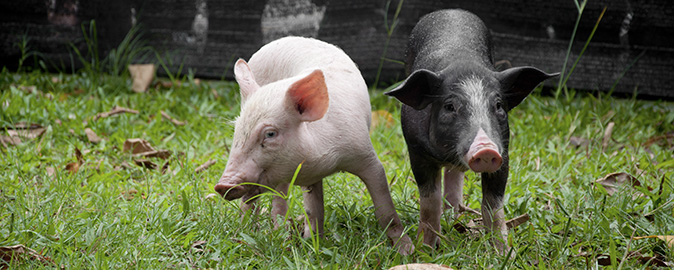New research: Danish organic products unknown to German consumers
Germany is the most important export market for Danish organic products, but now a new study shows that German consumers are largely unfamiliar with Danish organic products. This has consequences for the Danish export strategy for the German market, explains Professor John Thøgersen from Aarhus BSS at Aarhus University.

“Denmark... I’m thinking cold, flat and dull - it’s not a country that produces organic products.” These are the words of a German consumer in a study on Danish organic products, and that person, unfortunately, is not alone.
New research from the MAPP Centre at Aarhus BSS shows that when German consumers are in the supermarket shopping for organic foods, they do not add Danish products to the shopping cart. Apparently their knowledge of Danish organic products is low, and they prefer organic foods from the neighbouring countries the Netherlands and Austria.
“There aren’t many German consumers who prefer Danish organic products - even in northern Germany,” says Assistant Professor Susanne Pedersen, who is one of the researchers behind the study.
The researchers found that consumers in Munich (south) prefer organic products from Austria, while consumers in Münster (west) prefer Dutch products. The country of origin’s geographical proximity thus matters a lot - just not quite as much in Denmark’s case. Not even consumers in Hamburg (north) have a strong preference for Danish organic products - although the preference is stronger than further south.
In all three cities, consumers only have vague associations of Denmark as a country. They were relatively unfamiliar with Denmark as an exporter of organic products, and mentioned only very few products, such as Danish butter.
Organics and origin interact
John Thøgersen, Susanne Pedersen and their colleague, Associate Professor Jessica Aschemann-Witzel, are participating in the international research project “Sustainable Organic Market Development with International Trade”. The project aims to examine what ‘Made in Denmark’ means compared to, say, ‘Made in Austria’. The researchers call it the ‘country-of-origin’ effect and want to examine what this means in relation to imported organic carrots, pork and dairy products in Germany.
The point of departure for the researchers’ work has been that the geographical proximity of the neighbouring countries is of great importance when consumers choose products while shopping.
Organic image
Susanne Pedersen explains that German consumers use organic labelling along with information about the country of origin to assess the product’s quality and trustworthiness. She talks about an ‘organic image’.
“Germans’ general perception of a country and their faith in organic standards in many cases coalesce into an ‘organic image’. This has an impact when consumers assess imported organic products. The stronger the organic image, the more positive an assessment of the imported products,” says Susanne Pedersen.
Danish export strategy should be adapted
As such, the researchers suggest that Danish exporters should create more positive awareness of Danish organic products in German shops. German consumers need to hear the story of how Danish organic farmers produce healthy foods according to solid and well-founded organic standards that you can trust.
Helene Birk, International Marketing Manager in Organic Denmark and member of the project’s steering committee, supports the proposal and will make use of the new knowledge in her dialogue with German chains and in any additional work on promoting Danish organic exports.
“Denmark is the world’s leading organic nation, with long-standing organic traditions, strong product oversight and talented, innovative companies that produce high quality organic goods. The purchasers from the German chains and wholesalers know this, and they demand Danish organic products to a great extent when we hold export campaigns at foreign fairs or meetings with the purchasers. But naturally, the German consumers should also be aware of this,” says Helene Birk, and adds:
“Nearly half of the exported Danish organic products go to Germany, and exports to the country are increasing. But the research shows that there is an even greater potential on the German market if we strengthen the German consumers’ image of Denmark as an organic pioneer.”
That consumers use the country of origin as an indicator of product quality is not new, explain the researchers, but the study has, among other things, produced new knowledge about the role of transport distances, including the notion that German consumers prefer imported organic products from geographically close markets.
Currently, German organic farmers cannot keep up with the demand, in spite of an increase in the number of organic farmers and in the organic agricultural area. As such, German organic consumers can choose between a large number of foreign products when they explore the shelves with organic goods while shopping in German supermarkets.
According to Susanne Pedersen, Germany is the largest market for organic foods in Europe.
“Foreign products compete side by side for market shares - including Danish organic products. As an exporter in highly competitive circumstances, it is critical to know what’s important when consumers have to choose between organic products from different countries,” says John Thøgersen.
Contact information
Professor John Thøgersen
MAPP Centre
Aarhus BSS at Aarhus University
jbt@mgmt.au.dk
+45 2685 8167
Further information
Studies in the SOMDwIT project:
- Two cross-regional studies were conducted in three regions in Germany:
- Münster (west, close to the Netherlands)
- Hamburg (north, close to Denmark)
- Munich (south, close to Austria)
- A total of 160 interviews were conducted in the organic supermarket denn’s Biomarkt and 95 interviews in the supermarket chain Rewe. The consumers were interviewed while shopping. They were asked how important the country of origin is to them and to what degree they pay attention to whether the product comes from Denmark, Austria, etc.
- Two focus groups were conducted in Münster, Hamborg and Munich respectively to gain more information about German consumers’ associations with the surrounding countries and the products they export.
Facts about the project
- SOMDwIT is a part of the Organic RDD 2.2 programme, which is coordinated by ICROFS (International Centre for Research in Organic Food Systems).
- The project received a grant from a green development programme (Grønt Udviklings- og Demonstrationsprogram) under the Ministry of Environment and Food of Denmark.
- The project will run from 1 January 2016 to 31 December 2017. Over the course of the project, similar quantitative studies will be carried out in France, another important export market for the Danish organic sector, just as new markets in China and Thailand will be studied. The qualitative studies will be followed up by a questionnaire-based study in all four countries at a later point.
- Read more about SOMDwIT here
